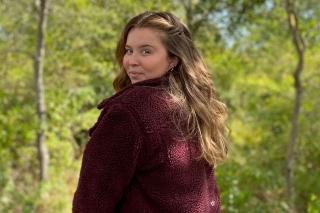What made you choose Simmons for your undergraduate degree?
The biggest draw for me was Boston. I'm from Portland, Maine, so Boston is only two hours away, and I could envision myself in Boston. Simmons was appealing for the small classes, and the ability to communicate with professors and be in community with them. It hadn't occurred to me to attend a women-centered college before, but when I visited I noticed how strong the community was, and recognized that same drive in the students. That made it feel like a really good place for me. Reflecting on it now, Simmons offered leadership opportunities and personal growth and development I may not have otherwise experienced.
What led you to study Social Work and Public Health?
I came to Simmons undecided [on my major], but I knew I wanted to do something in mental health/human services. I considered neuropsychology, but I'm not a science person. While in high school I was part of a dance company that offered free classes to the community, which sparked my interest in community outreach. And I was interested in mental health because, who hasn't had experiences with anxiety? During winters in Maine, it gets dark very early, and a lot of people suffer from seasonal affective disorder. Also, I had strong connections with the social worker and guidance counselor at my school.
At Simmons, a friend of mine was studying social work, so I tried it. After taking two classes, I was ready to commit to social work as my major. Social work was just what I had been looking for, combining mental health, social justice, and empowerment of all people. It wasn't just the classes, but the faculty who sold it for me. The professors were able to expand my knowledge and push me to get where I wanted to be.
Tell us about your work as a therapist.
I'm a licensed clinical social worker (LCSW), working as an outpatient therapist. I see individual clients for long term work, all with varying mental health diagnoses. I work with people to set attainable goals, figure out what skills they need to achieve those goals, and what are the barriers in their current mindframe. I use traditional treatment methods such as dialectical behavior therapy, and cognitive behavioral therapy. I like to take a holistic approach to mental health, using internal family systems theory and somatic work.
While I was at Simmons, there was an emphasis on self-care. In the social work program, faculty made it clear that you could not do this job if you didn't practice self-care. I was a dancer for most of my life, but I needed something that connected mind, body, and soul. That's how I started yoga. Now I'm a certified Kripalu Yoga Instructor, which I utilize along with my training in treating complex trauma.
What do you find most rewarding about this work?
Being in a long-term setting with patients. At Simmons, I did my clinicals at Beth Israel and Boston Children's. My work with patients at Children's was short-term, making sure their immediate needs were met. At Beth Israel, I worked in the Center for Violence Prevention and Recovery, where clinicians saw patients for longer-term care. That experience lit my fire for trauma work. It's about creating a sense of safety for the patient, and I can see the progressive changes over time. That is my favorite part of this work — the genuine human connection that allows a relationship to form and see [positive] change.
How did Simmons prepare you to become a leader in your field?
So many ways! I'm not the same person as I was when I walked into Simmons at 18 years old. I didn't have the confidence that I have now. Simmons pushes you to be your own leader, your own individual in the world. I learned a lot about advocacy, for myself and for society. My class frequently formed petitions for things we thought were unjust, and that instilled in me an ability to advocate not only for myself, but my community.
I couldn't have asked for a better foundation for the work that I do now, and part of that is from being at a women-centered college. As a cis hetero woman, I've encountered [difficult] situations in therapeutic services. Now I realize that if I feel discomfort, [members of marginalized groups] will feel it more. What's the system level change that needs to happen here? Simmons taught me to look beyond myself.
Advice for students?
Be open to the experience! Coming to Simmons as an undecided student, I wouldn't have found what I was looking for if I wasn't open to letting it all happen. I had the flexibility to try things, to figure out what fit, which helped me see what was going on inside of me and what I was seeking.
Realize what you can control and what you can't, and you may see a really beautiful change unfold in yourself and the path you're on. Simmons is a special place, and everyone finds where they're supposed to be, even if it [takes time]. That was true for me and others. Also, no one can help you if they don't know [your struggles]. If you say that you need help finding your path, people will help you!
Current self care tips?
I try to get outside when I can in the winter. I also like having a routine that I look forward to at the end of the day. Every evening, I turn on the "fake fireplace" on Netflix, light a candle, and read a book.
Mental health resources at Simmons include the Counseling Center, the REEF Support Center, and Wellness Ambassadors for peer support.

